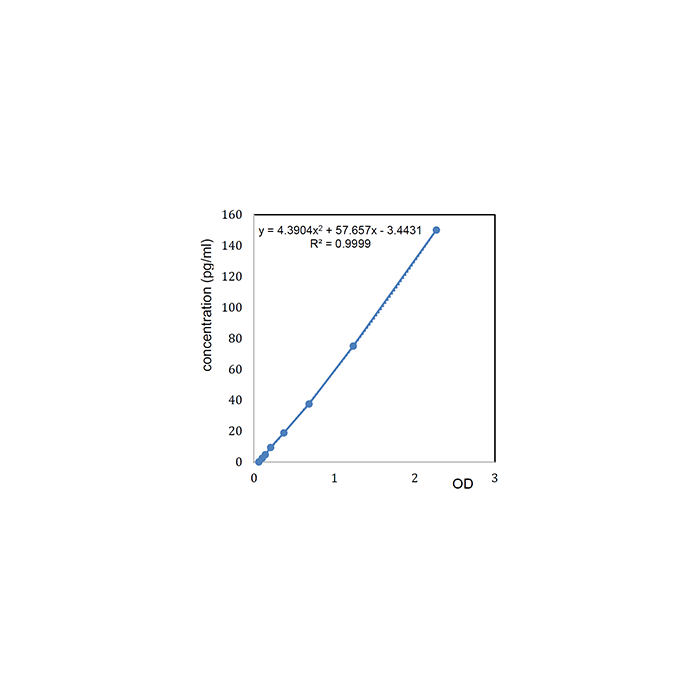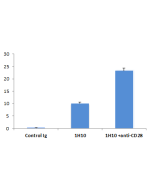Cookie Policy: This site uses cookies to improve your experience. You can find out more about our use of cookies in our Privacy Policy. By continuing to browse this site you agree to our use of cookies.
AdipoGen Life Sciences
PD-L1 (human) ELISA Kit

| Product Details | |
|---|---|
| Synonyms | Programmed Cell Death 1 Ligand Protein 1; PDCD1 Ligand 1; B7-H1; PDL1; CD274 |
| Product Type | Kit |
| Properties | |
| Application Set | Quantitative ELISA |
| Specificity |
Detects soluble human PD-L1 (sPD-L1) in serum, plasma and cell culture supernatant. |
| Crossreactivity | Human |
| Quantity |
1 x 96 wells |
| Sensitivity | 0.8pg/ml |
| Range | 2.34 to 150pg/ml |
| Sample Type |
Cell Culture Supernatant Plasma Serum |
| Assay Type | Sandwich |
| Detection Type | Colorimetric |
| Other Product Data |
UniProt link Q9NZQ7: PD-L1 (human) |
| Declaration | In collaboration with Suzhou Bright Scistar Biotechnology |
| Accession Number | Q9NZQ7 |
| Shipping and Handling | |
| Shipping | BLUE ICE |
| Short Term Storage | +4°C |
| Long Term Storage | +4°C |
| Handling Advice |
After standard reconstitution, prepare aliquots and store at -20°C. Avoid freeze/thaw cycles. Plate and reagents should reach room temperature before use. |
| Use/Stability | 12 months after the day of manufacturing. See expiry date on ELISA Kit box. |
| Documents | |
| Manual |
 Download PDF Download PDF |
| MSDS |
 Download PDF Download PDF |
| Product Specification Sheet | |
| Datasheet |
 Download PDF Download PDF |
PD-L1 (also known as Programmed Cell Death 1 Ligand Protein 1; CD274 or B7-H1) is an immuno-coinhibitory member of the B7 family and functions as an immune checkpoint via its interaction with its receptors PD-1 (CD279) and CD80 (also known as B7-1). PD-L1 is expressed by hematopoietic cells such as T, B and dendritic cells and by parenchymal cells in response to cytokine (i.e. IFN-γ) induction. Ligation of PD-1 by PD-L1 (B7-H1; CD274) or PD-L2 (B7-DC; CD273) inhibits TCR-mediated T cell proliferation and production of IL-1, IL-4, IL-10 and IFN-γ and also inhibits BCR mediated signaling. PD-L1 binding to CD80 inhibits T cells proliferation. PD-1 deficient mice have a defect in peripheral tolerance and spontaneously develop autoimmune diseases. Soluble form of PD-L1 (sPD-L1) is expressed upon immune cells activation and can be secreted in the serum/plasma. Soluble checkpoints, such as sPD-1 or sPD-L1, are involved in positive or negative immune regulation and changes in their serum/plasma levels affect the development, prognosis and treatment of cancer. Increase of sPD-L1 or sPD-1 levels have been detected in patients with different types of cancer. This PD-L1 (human) ELISA kit is developed to detect specifically sPD-L1 (human) in different biological fluids.
-
Multi-omics analysis of human mesenchymal stem cells shows cell aging that alters immunomodulatory activity through the downregulation of PD-L1: Y. Gao, et al.; Nature Commun. 14, 4373 (2023)







![CD274 [B7-H1/PD-L1] (human):Fc (human) (rec.) (non-lytic)](https://update.adipogen.com/media/catalog/product/placeholder/default/adipogen_logo_bw_3.png)
![CD274 [B7-H1/PD-L1] (human):Fc (human) (rec.)](https://update.adipogen.com/media/catalog/product/cache/9c281c7ec96bf9060309dac73f492a03/c/h/chi-hf-210pdl1-biological_activity-400px.png)